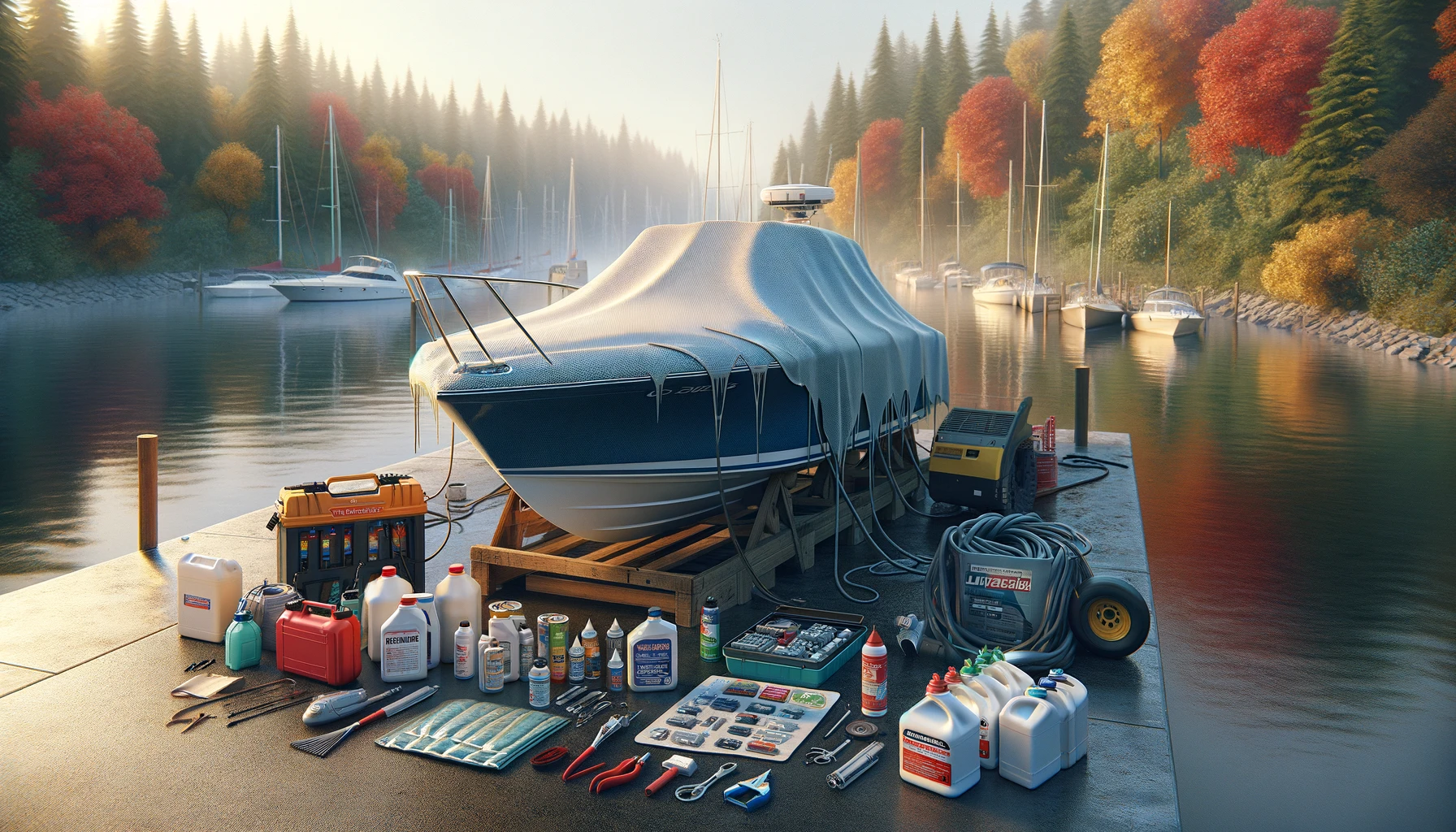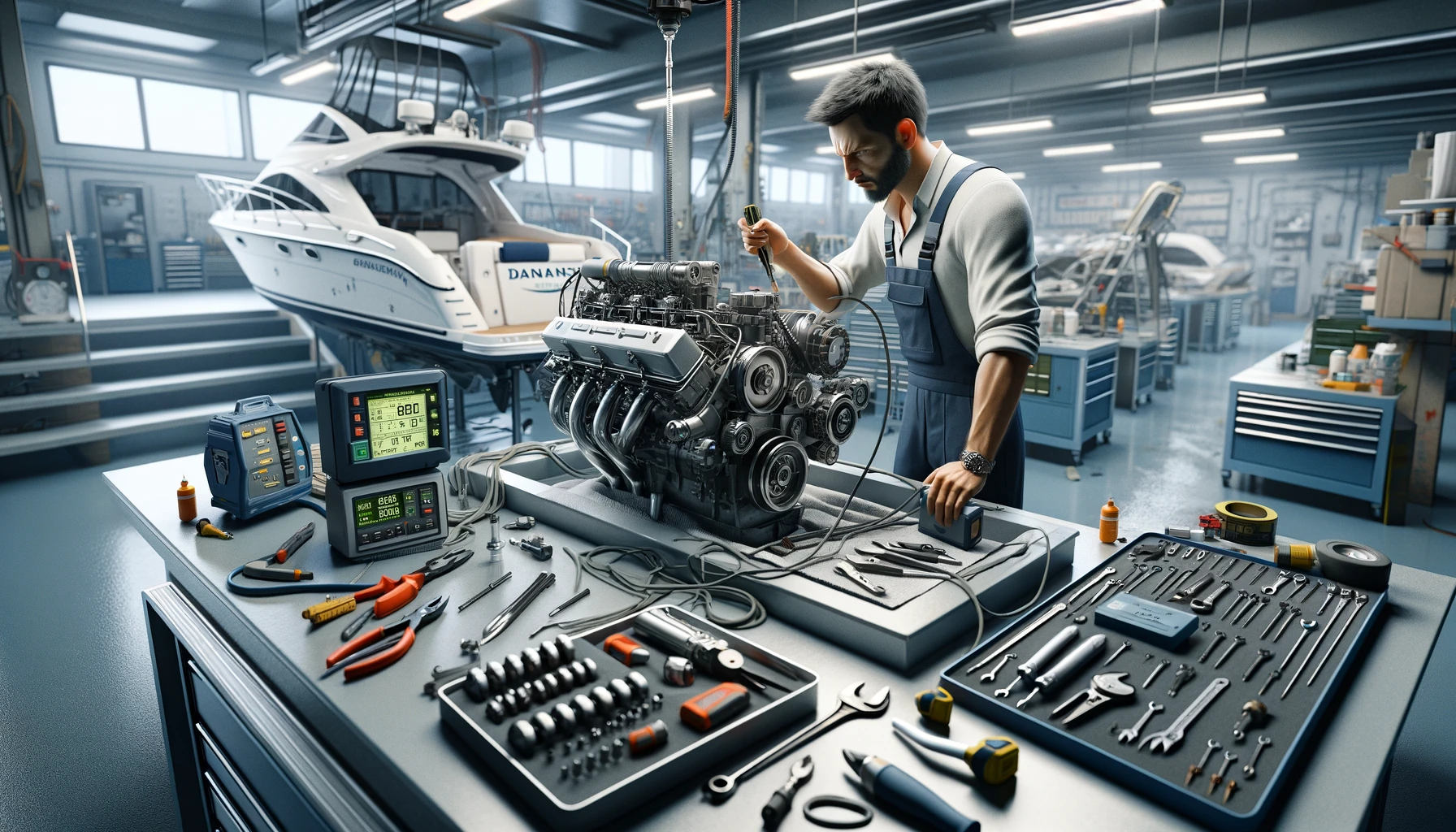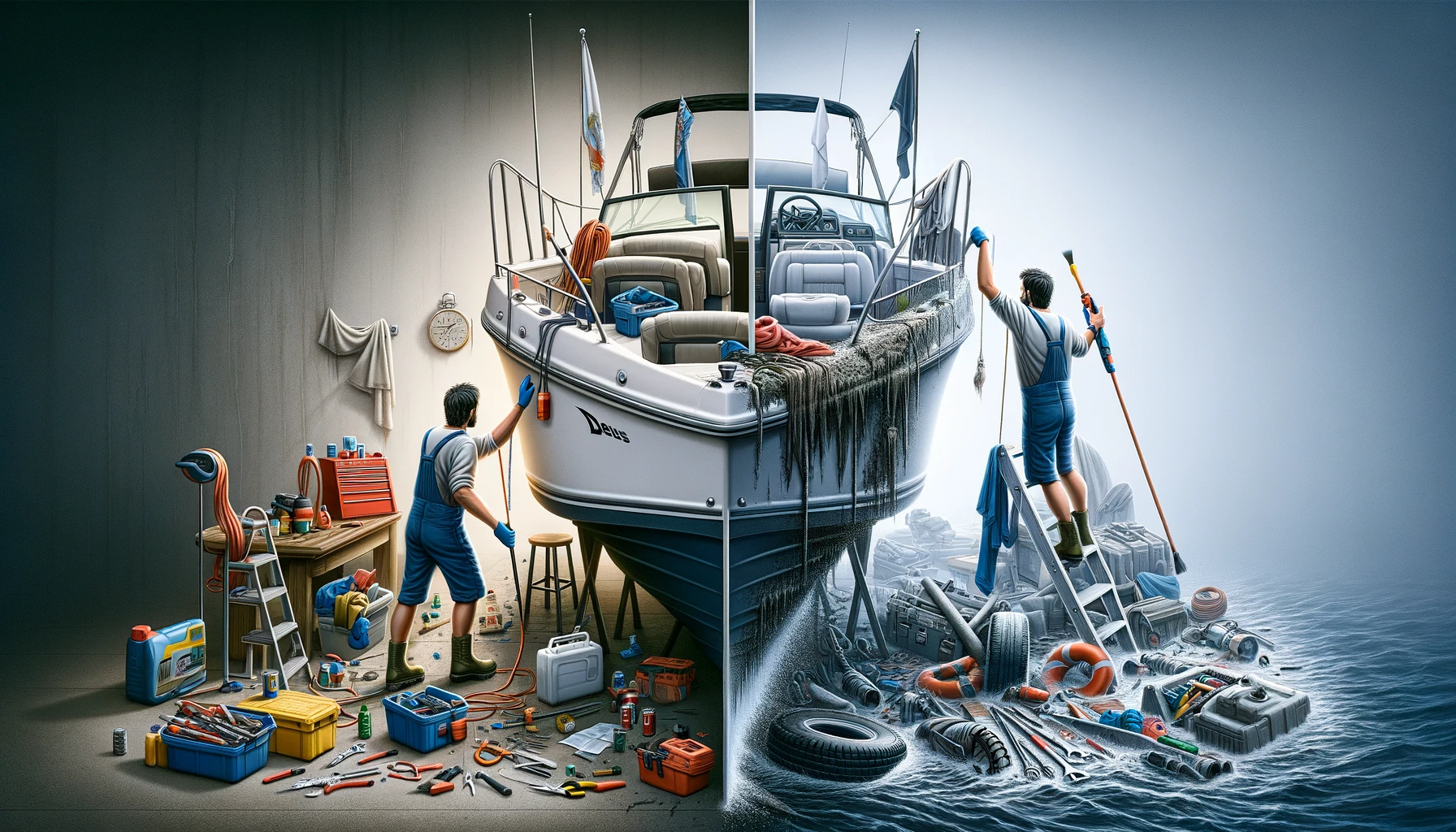Ah, the bliss of being out on the water—there’s truly nothing like it. Whether it’s the gentle lapping of the waves against the hull or the thrill of catching the perfect wind, owning a boat offers an unparalleled sense of freedom and adventure. Yet, as every seasoned skipper knows, this freedom comes with a responsibility: the imperative of regular boat maintenance. The sea is as demanding an adversary as it is a beautiful escape, and it requires us to keep our vessels in prime condition to safely navigate its challenges.
In my years of boating, I’ve come to realize that maintenance is not just about preventing issues but enhancing the bond between the boat and its owner. Each check, repair, and polish isn’t merely a task; it’s a ritual that ensures the health and longevity of our cherished escape. That’s why I’ve compiled these essential boat maintenance tips, drawing from a wellspring of experience and shared wisdom from fellow enthusiasts. This guide isn’t just a list of tasks; it’s a roadmap to ensuring your vessel remains as resilient and ready as the day you first set sail.
From the importance of regular inspections to the nuances of seasonal care, we’ll navigate through the essential upkeep advice that every boat owner should know. Whether you’re a seasoned sailor or new to the helm, maintaining your boat effectively is crucial for ensuring it keeps sailing smoothly through many adventures to come. Let’s embark on this journey together, armed with the best boat care essentials, repair basics, and an unwavering love for the open water.
Contents
Understanding Your Boat

Before we dive into the nuts and bolts of maintenance, it’s crucial to understand that not all boats are created equal. From sleek sailboats catching the breeze to robust powerboats making waves, each type of vessel has its unique charm and, accordingly, its specific maintenance needs. Understanding your boat’s particular requirements is the first step in a comprehensive maintenance routine that ensures its longevity and safety.
The Diversity of Boats
Boats are as diverse as the people who love them. Sailboats, with their graceful masts and reliance on the wind, demand a different kind of care, particularly for their sails and rigging. Powerboats, on the other hand, require more attention to their engines and hull integrity to keep them roaring across the waves. And let’s not forget the tranquil pontoons and the agile kayaks, each with their own set of upkeep rules to ensure they provide the maximum amount of enjoyment.
Universal Maintenance Needs
Despite these differences, there are universal maintenance truths that apply to all types of vessels. The integrity of the hull, the efficiency of the engine (if your boat has one), and the reliability of the electrical systems are paramount. Ensuring these fundamental components are in top condition is crucial, irrespective of your boat’s size or style.
The Importance of Specialization
While many essential boat maintenance tips can be applied broadly, some aspects of upkeep are best handled with a specialized approach. For example, the care for a fiberglass hull differs significantly from that of a wooden one. Similarly, outboard motors and inboard engines have distinct maintenance protocols. Recognizing these differences is key to effective boat care.
Tailoring Your Maintenance Routine
Embracing the uniqueness of your boat means tailoring your maintenance routine to fit its specific needs while also adhering to the general principles of boat upkeep. This personalized approach not only enhances the performance and safety of your vessel but also deepens your connection to it. As you learn the intricacies of your boat’s requirements, you’ll become more attuned to the subtle signs that indicate when attention is needed, ensuring your boat remains a faithful companion on all your aquatic adventures.
Essential Boat Maintenance Tips

Maintaining a boat is much like caring for a close friend; it requires attention, respect, and regular check-ups to ensure it’s always in its best shape. Whether you’re tackling the open sea or cruising through tranquil lakes, here are some essential maintenance tips that every boat owner should know.
Regular Inspections
Consistency is Key: Regularly inspect your boat for any signs of wear, damage, or potential issues. This includes checking the hull for cracks, inspecting the propeller for dents, and ensuring all safety equipment is in order and readily accessible. Think of these inspections as a boat health check-up that can prevent minor issues from becoming major problems.
Cleaning and Hull Care
A Clean Boat is a Happy Boat: Saltwater and freshwater can both leave damaging residues on your boat’s hull. Regular cleaning not only keeps your boat looking great but also prevents the long-term effects of water damage, such as corrosion and blistering. Use marine-specific cleaning products to protect your boat’s finish and consider applying a protective wax coating at least twice a year.
Engine and Propulsion System Maintenance
The Heart of Your Vessel: The engine and propulsion system are crucial for your boat’s performance. Regular maintenance, including oil changes, filter replacements, and cooling system checks, will ensure your engine runs smoothly and efficiently. Pay special attention to the propeller; even minor damage can lead to decreased performance and increased fuel consumption.
Electrical System Checks
Keep the Lights On and the Engine Starting: Electrical issues can be both frustrating and dangerous. Regularly inspect your boat’s electrical connections for signs of corrosion, ensure your battery is charged and functioning correctly, and check that all lighting and navigational equipment are operational.
Sail and Rigging Maintenance (for sailboats)
Keep It Tight and Right: For those who love the elegance of sail, maintaining your sails and rigging is essential. Inspect sails for tears, wear, and UV damage, and check all rigging for signs of wear, corrosion, or damage. Regular adjustments and inspections will keep your sailing experience smooth and enjoyable.
Boat maintenance might seem daunting at first, but with regular care and attention, it becomes a rewarding part of the boating experience. By following these essential boat maintenance tips, you’re not just caring for your boat; you’re ensuring countless memorable adventures on the water. Remember, a well-maintained boat is a dependable partner in all your nautical explorations.
Seasonal Maintenance Tips

As boat owners, we’re attuned to the rhythms of nature, adjusting our maintenance routines with the changing seasons. The right preparation not only extends the life of your boat but also ensures it’s ready to go when the weather is perfect for sailing. Here’s how to keep your vessel in peak condition year-round.
Preparing for Winter
Winterizing Your Boat: When the temperature drops, it’s time to give your boat the care it needs to weather the cold months ahead. Winterizing is a comprehensive process that involves:
- Draining any water from the hull, engine, and plumbing to prevent freezing damage.
- Applying antifreeze to the engine and water systems as necessary.
- Cleaning and drying the boat thoroughly to prevent mold and mildew.
- Storing sails, cushions, and other fabric items in a dry, ventilated space to avoid damage.
- Covering your boat properly to protect it from the elements, using a breathable cover to prevent moisture buildup.
Gearing Up for Summer
Summer Preparation: With the advent of warmer weather, it’s time to get your boat ready for the busy season. Summer preparations include:
- Inspecting the hull for any needed repairs or maintenance after the winter months.
- Checking and servicing the engine to ensure it’s in top running condition.
- Verifying that all safety equipment, including life jackets and fire extinguishers, are in good condition and easily accessible.
- Updating navigation charts and electronics as needed.
- Applying a fresh coat of wax to protect the hull from UV damage and keep it looking its best.
Throughout the Seasons
Year-Round Vigilance: In addition to the specific tasks required for winterizing and summer preparation, there are several maintenance activities to perform regularly, regardless of the season:
- Monitoring and maintaining battery levels.
- Keeping the bilge clean and dry.
- Regularly checking and lubricating moving parts, such as hinges, winches, and pulleys.
- Inspecting and maintaining the boat’s electrical system to ensure everything is functioning correctly.
Adapting your boat maintenance routine to the changing seasons is key to ensuring its longevity and reliability. By following these seasonal maintenance tips, you can enjoy peace of mind knowing that your boat is well-cared for and ready for whatever adventures lie ahead. Remember, a little preparation goes a long way in the world of boating.
When to Seek Professional Help

Owning a boat is a journey filled with learning and hands-on experiences. However, there are times when the expertise of a professional is not just helpful but necessary. Recognizing when to call in the experts can save you time, money, and ensure the safety of your vessel and everyone on board.
Identifying Complex Issues
Beyond Basic Maintenance: While regular upkeep can be managed by diligent owners, certain issues require specialized knowledge and tools. These include:
- Advanced electrical system problems.
- In-depth engine repairs or rebuilds.
- Structural repairs to the hull or deck.
- Installation of complex electronics or navigation systems.
Ensuring Safety
Safety First: Some repairs are not just about expertise but also safety. Professional boat mechanics and technicians are trained to handle:
- Gasoline engine repairs, which pose risks of fire or explosion.
- Steering and throttle system repairs, where mistakes can lead to loss of control on the water.
- Any repair involving the boat’s structural integrity that could affect its seaworthiness.
Professional Assessments
A Worthwhile Investment: Regular professional assessments can identify potential issues before they become major problems, offering:
- Detailed engine diagnostics.
- Hull integrity checks.
- Safety equipment inspections and updates.
Building a Relationship with a Marine Mechanic
Find a Trusted Partner: Establishing a relationship with a reliable marine mechanic or service center can provide peace of mind, ensuring that someone familiar with your boat is available to assist when needed. Look for certified professionals with experience in your type of vessel.
Knowing when to seek professional help is a crucial aspect of responsible boat ownership. While the DIY approach is commendable and often sufficient for basic maintenance, recognizing the limits of your expertise and the potential risks involved in more complex repairs is essential. By partnering with professionals for certain tasks, you ensure that your boat remains in safe, capable hands, ready for your next adventure on the water.
The Do’s and Don’ts of Boat Maintenance

Boat maintenance is both an art and a science, requiring a blend of knowledge, diligence, and sometimes, restraint. Here are some essential do’s and don’ts that can help guide your maintenance routine, ensuring your boat remains a source of joy and not frustration.
The Do’s
Do Perform Regular Inspections: Routine checks are your first line of defense against potential issues. Inspect your boat thoroughly before and after each use, looking for signs of wear, damage, or any changes that might require attention.
Do Follow a Maintenance Schedule: Stick to a regular maintenance schedule based on manufacturer recommendations and your own usage patterns. This includes engine maintenance, hull cleaning, and checking safety equipment.
Do Use Quality Materials and Tools: Investing in high-quality maintenance materials and tools pays off in the long run. Use marine-grade products designed for the specific demands of boating to ensure the best care for your vessel.
Do Keep Detailed Records: Maintain a log of all maintenance activities, repairs, and replacements. Detailed records can help troubleshoot future problems and are valuable for potential buyers if you decide to sell your boat.
Do Educate Yourself: The more you know about your boat and how it works, the better equipped you’ll be to maintain it properly. Take advantage of courses, manuals, and online resources to build your knowledge.
The Don’ts
Don’t Ignore Small Problems: Small issues can quickly become big, expensive problems if left unaddressed. Tackle repairs promptly to avoid more significant damage down the line.
Don’t Neglect the Bilge: The bilge should be kept clean and dry to prevent mold, mildew, and corrosion. Regularly check your bilge pumps to ensure they’re working correctly.
Don’t Skimp on Safety Equipment: Your safety equipment is critical. Don’t cut corners or neglect to check and maintain life jackets, fire extinguishers, flares, and other safety gear.
Don’t Overlook the Importance of a Clean Boat: Regular cleaning is about more than aesthetics; it’s a crucial part of maintenance that protects your boat from corrosion, UV damage, and other environmental factors.
Don’t Hesitate to Seek Professional Advice: If you’re unsure about a maintenance task or face a problem beyond your expertise, consult a professional. It’s better to seek help than to risk causing further damage.
By following these do’s and don’ts, you’ll set a solid foundation for keeping your boat in top condition. Regular, thoughtful maintenance not only extends the life of your boat but also enhances your enjoyment and safety on the water. Remember, a well-maintained boat is a happy boat, ready for any adventure that calls.
Final Remarks: Essential Boat Maintenance Tips

As we bring our voyage through the essential maintenance tips and practices for boat ownership to a close, it’s important to reflect on the journey we’ve undertaken together. Owning a boat is more than just a hobby or a passion; it’s a commitment to the craft of navigation, the art of maintenance, and the continual pursuit of knowledge and skill enhancement. The sea, with all its beauty and challenges, demands respect—a respect that is mirrored in the care we extend to our vessels.
Throughout this guide, we’ve navigated the intricacies of routine upkeep, the nuances of seasonal preparation, the wisdom in seeking professional help, and the importance of adopting a proactive stance towards maintenance. Each piece of advice, each tip, and each shared experience is a stepping stone towards not only ensuring the longevity and reliability of your boat but also enhancing your bond with the sea.
Moreover, the resources and further reading recommended are not merely suggestions; they are tools to empower you as a boat owner. They offer the chance to dive deeper, understand more fully, and appreciate the complex beauty of your vessel. The journey of boat ownership is one of continuous learning, where every day presents an opportunity to grow, to improve, and to prepare for the next adventure that lies beyond the horizon.
Let this guide be a compass that points you towards meticulous care, informed decisions, and a deeper connection with your boat. Remember, the essence of great boat maintenance lies not only in the tasks we perform but in the attitude with which we approach them. It’s about stewardship, respect for the craft, and a love for the open water.
In the end, the smooth sailing of your boat reflects the dedication you put into maintaining it. As you apply the insights and practices shared, you not only preserve the vessel itself but also the countless memories and adventures it holds. Your boat is more than a means to traverse the water; it’s a companion on a journey filled with discovery, challenge, and joy.
May the winds be favorable, and your maintenance diligent. Here’s to smooth sailing and the countless voyages that await on the boundless blue.
Resources and Further Reading
The journey of boat ownership is a continuous learning experience, where there’s always something new to discover or a skill to refine. To further your knowledge and ensure your boat remains in pristine condition, I’ve curated a list of resources and recommended reading. These resources span from beginner guides to advanced manuals, covering every conceivable aspect of boat maintenance.
Books and Manuals
- Comprehensive Boat Maintenance Manuals: Look for books that cover a wide range of topics, from basic upkeep to more complex repairs and upgrades. Manuals specific to your boat’s make and model are invaluable.
- Engine Repair and Maintenance Guides: Since the engine is the heart of your boat, having detailed guides on hand can help you understand and tackle engine-related issues with greater confidence.
Online Resources
- Boating Forums and Communities: Engaging with an online community can provide you with a wealth of knowledge and experiences shared by fellow boating enthusiasts. Some of the most recommended forums include:
- The Hull Truth is known for its vast membership and wide range of discussion topics from industry news to sport fishing (The Hull Truth).
- iboats Boating Forums offer discussions on general boating questions and specific engine topics, making it a great resource for troubleshooting and maintenance advice (iboats).
- A comprehensive list of forums, including specialized communities like Cruisers Forum for cruising enthusiasts and SailNet for sailboat owners, can be found at PowerSportsGuide, which outlines the best boating forums you should consider joining (PowerSportsGuide).
- Manufacturer Websites: For detailed information about parts, upgrades, or maintenance schedules, visiting the website of your boat’s manufacturer is crucial. These sites often provide owner’s manuals, FAQs, and contact information for customer support.
- Instructional Videos: YouTube and Vimeo are excellent platforms for finding how-to videos on boat maintenance, repairs, and upgrades. Channels dedicated to boating and marine equipment manufacturers often post tutorials and product overviews.
Professional Courses and Certifications
- Boat Maintenance Courses: Consider enrolling in courses offered by maritime institutions or community colleges. These can range from general maintenance to specialized skills like fiberglass repair or marine electronics.
- Certifications: Earning certifications can not only deepen your knowledge but also empower you to perform more complex maintenance tasks confidently and safely.



